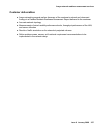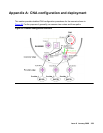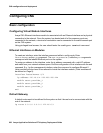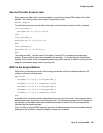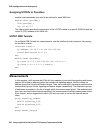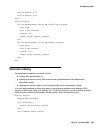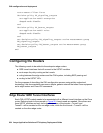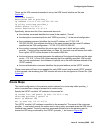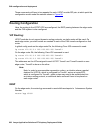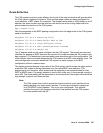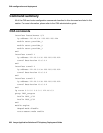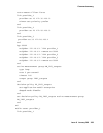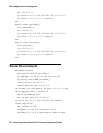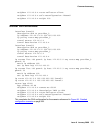
Configuring the Routers
Issue 6 January 2008 365
These are the IOS commands needed to set up the GRE tunnel interface on Ra (see
Figure 95
):
interface Tunnel1
description GRE to provider_1
ip address 172.25.5.129 255.255.255.252
ip policy route-map provider_1
tunnel source 172.16.6.1
tunnel destination 172.16.6.4
Specifically, here’s what the Cisco commands above do:
● the interface command identifies the tunnel to be created—Tunnel1
● the description command adds the text “GRE to provider_1” to the tunnel configuration
● the ip address command identifies the tunnel IP address as 172.25.5.129
255.255.255.252; this address should be in the same network as the tunnel IP address
specified on the CNA configuration—172.25.5.130 255.255.255.252
● the ip policy command identifies the route map to be used, which we have called
provider_1 (which will be created below, on Page 12); the route map will ensure that traffic
from a given USTAT will be directed to the correct WAN link
● the tunnel source command designates the address of the physical interface on the edge
router—172.16.6.1 (Cisco IOS syntax requires that it be explicitly specified; CNA syntax
has no such requirement—the address is implicitly set to the eth0 interface address of the
USTAT module)
● the tunnel destination command identifies the physical address on the USTAT module
These commands will have to be repeated for each GRE tunnel (one for each USTAT module).
In this example, the remaining two GRE tunnels will have to be configured on Router Rb. (See
Figure 95
.)
Route Maps
The tunnel configuration in the previous section referred to a route map called provider_1,
which is created here, along an access list to restrict entry.
Specify the USTAT module’s VIP address in the access list:
ip access list 188 permit ip host 172.25.5.1 any
route-map provider_1 permit 10
match ip address 188
set ip next-hop 172.30.100.33
The USTAT module’s VIP address is specified in the access list. The name of the route map,
provider_1, must match exactly the name used in the ip policy command when the GRE tunnel
interface was created. The set ip next-hop command should point to the address used to
access the ISP being monitored by this USTAT (provider_1, as shown in Figure 95
).



